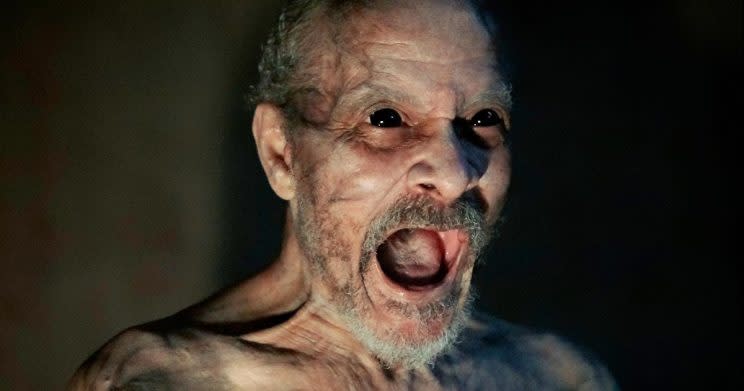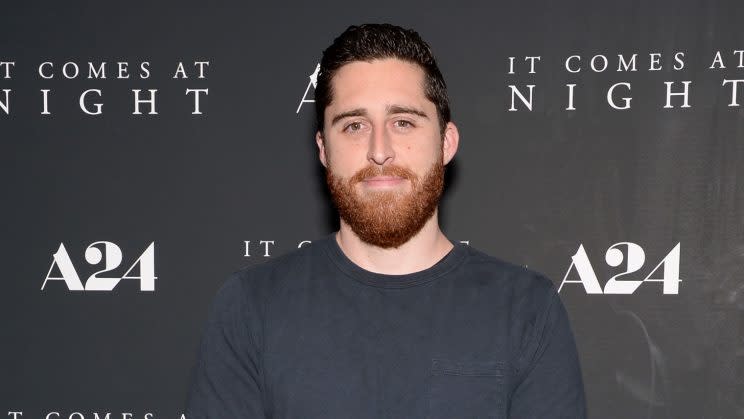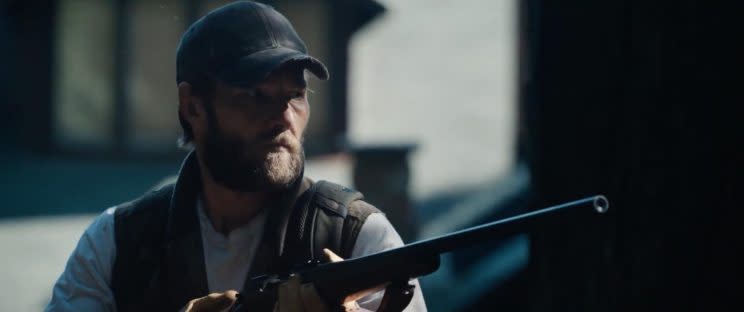'It Comes At Night': How Personal Family Trauma Inspired Trey Edward Shults to Craft the Summer's Creepiest Film

Warning: Minor spoilers ahead.
In early 2016, A24 released Texas filmmaker Trey Edward Shults’s directorial debut, Krisha, a devastating, stylistically stunning drama about an alcoholic woman’s ill-fated attempt to reconnect with her family on Thanksgiving. Despite a big win at the Spirit Awards, the indie managed a meager $144,000 at the box office, which made it the 363rd “highest” grossing film of the year.
But cinephiles and critics took notice. “Are we watching the emergence of America’s next great filmmaker?” asked Time Out London, while other reviewers likened Shults to a budding auteur in the mold of Paul Thomas Anderson. Krisha was all the more impressive given its underdog pedigree and guerrilla DNA: The project started as a failed feature-turned-short-turned-feature again, and Shults shot the entire film at his mother’s house, casting himself and other kin, led by a tour de force performance by his aunt, Krisha Fairchild, in the title role. As Shults and Fairchild told Yahoo Movies upon its release, the film was inspired by the addiction and tragic death of his cousin/her niece.
For his next act, Shults makes a logical progression, remaining in the realm of what can be can be called human horror, this time with more emphasis on the horror. His new film, It Comes at Night, is a psychologically tense and unsettling frightfest about a family of three attempting to survive in the isolation of a cabin in the woods in a dystopian-as-hell future where anything (or anyone) lurking outside poses a threat. It could be summer’s creepiest film, and once again was born out of a deeply personal place.
“This all started with my dad’s death,” Shults, 28, told us over lunch in Beverly Hills, noting his relationship with his father also inspired his character’s relationship with Krisha in his earlier film. “He battled addiction for a long time. For a lot of my upbringing he was good and had everything together, and then his life kind of crumbled and he started using again. So I cut off our relationship and I didn’t see him for 10 years. And then I saw him on his deathbed with pancreatic cancer. And it was the first time I had ever been that close with death, especially with someone so close to me. It was one of the most traumatic [events] of my life. It’s affected me every day since.”

In the film’s opening scene, the family (Joel Edgerton as Paul; Cameron Ejogo as his wife, Sarah; and newcomer Kelvin Harrison Jr. as their teenage son, Travis) are forced to execute Sarah’s father, Bud (David Pendelton), who has contracted a mysterious virus. What Sarah tells Bud in the first lines we hear (“Can you hear me? Everything’s OK now. You can let go.”) is exactly what Shults told his own father in his last moments before dying.
“My dad was so full of regret for everything and the life he lived. He wasn’t ready to let go,” Shults said. “I was just trying to help him find peace.”
Shults had imagery and the loose framework of a story in his mind about this family in a remote, post-apocalyptic house. Then, two months after his father’s death in 2014 — and before he shot the first iteration of Krisha — he went to work on the script for It Comes at Night. “I was just in a dark place in general,” he said. ” My relationship wasn’t great with my girlfriend. I was reading books on genocide.” He thought about “humans and cycles of violence and how we keep repeating them.” His concern for the future of humanity meshed with meditations on regret and death. He thought of the history of people and tribalism, and how as the Earth’s population became civilized family became the new tribe.
It all brought him to the conceit of Night. While Paul, Sarah, and Travis lead a quiet, isolated existence, everything changes when they agree to take in Will (Christopher Abbott), Kim (Riley Keough), and their young son. “The idea was to put these two tribes under one roof and see what happens,” Shults said. “How far is too far? And what’s worse than death? It’s losing humanity.”

Portrayed by Edgerton (who is also an executive producer on the film) as a brutish enigma, Paul is based on a hybrid on Shults’s father and stepfather. “My stepdad, he can be a very paranoid person. Literally the line Joel says in the movie, ‘You can’t trust anyone but family’ is what my stepdad has told me my entire life…. But when Joel’s character loses his temper, that’s a hundred percent my biological dad.”
On the screen, everything is not as it seems. Shults points to the relationship between Paul (who is white) and Travis (whose mother is black, so it’s assumed he’s mixed race). “I think that Paul is Travis’s stepdad, technically,” he revealed. In another patriarchal twist, pay attention to the scene when Paul and Will confront strangers in the woods: “They look like father and son,” Shults said.
While It Comes at Night can adequately be described as slow-burn or “art-house” horror à la the 2015 sleeper It Follows — and has prompted comparisons of Shults to a young John Carpenter — it’s a film that finds its most psychologically piercing moments in the unseen. Which is why the director cautions not to take the film’s title too literally. “It speaks to what the movie’s about thematically,” he said. “And I think it can mean different things to different people, at the risk of sounding pretentious.” As for what the title means to Shults? “At night is when my mind races like crazy. When everyone’s sleeping and it’s just you, that’s when you’re inside your own head. That’s when you can think about your fears… But I’m sure there will be some people who are like, ‘This isn’t a monster movie? This is bulls–t.'”
It Comes at Night was shot over 26 days last August in the rural upstate New York community of Byrdcliffe, near Woodstock. A24, the taste-making studio behind Moonlight, is distributing, having financed the film after striking a deal with Shults at the 2015 Cannes Film Festival to release Krisha.
Shults also edited the film, and while its production ran smoothly, it was “in the bay” where he found the bleakness of the material grating. He recalls staying in an Airbnb apartment in New York that didn’t have shades on the windows, so he’d drape a sheet over his head, where he worked in his “cone of darkness” with headphones and his laptop. “Hearing [those] screams at the end of the movie, I have post-traumatic stress disorder from that sequence.”
The film premiered to raves at the Oregon-based Overlook Film Festival in March, fitting given that the movie is set in the hotel lodge made famous by Stanley Kubrick’s 1980 classic The Shining, one of Shults’s biggest influences in making Night. “I always thought of it as a horror movie more in the vein of The Shining or The Thing or Night of the Living Dead, but mashed with a family drama,” he said. And, of course, he also watched Anderson’s There Will Be Blood “a million times” before completing Night.
Shults admitted he has found the entire experience of making the film therapeutic: “This movie was the dark beast, the demon within me, that I had to get out. So I definitely want to change it up for the next movie.”
While the young filmmaker has managed to avoid packing up for Los Angeles — in fact, he’s moved further away, recently relocating from Austin, Texas, to Miami and then to Orlando — major Hollywood studios will no doubt come calling given his growing reputation thanks to Krisha and Night. As for what a bigger-budgeted movie of his might look like, Shults ponders the possibility of adapting the PlayStation game The Last of Us. “I played it after I wrote Night and I’m sure the imagery inspired my direction. But I feel like you could make an awesome movie version of that.”
Shults already has a third film in mind, though, and he’s in the process of writing it. “It has elements of [It Comes at Night], elements of Krisha, but it’s still something new and different. It’s certainly not a light comedy, but it’s a different tone that I could play with,” adding that it’s told in two parts, concerns high school kids, and “flows like a piece of music” in the same vein as films like Boogie Nights, Goodfellas, and Dazed and Confused.
And there’s no doubt it will be personal.
It Comes at Night is now in theaters. Watch the trailer:
Read more from Yahoo Movies:

